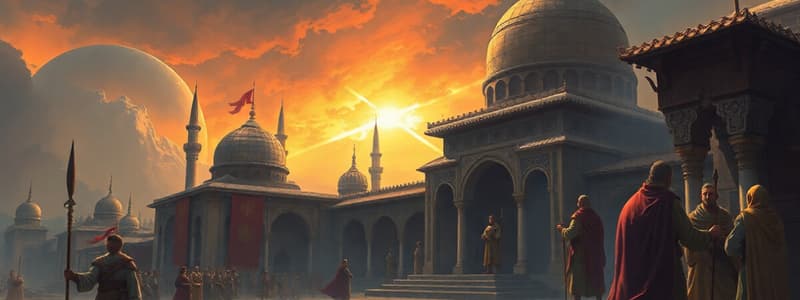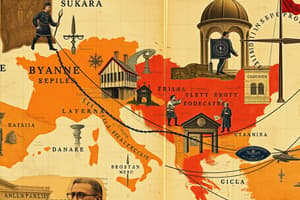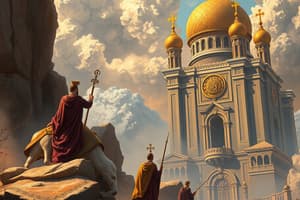Podcast
Questions and Answers
Which feature might impede an invasion from the west into Constantinople?
Which feature might impede an invasion from the west into Constantinople?
Which structure acts as a significant defensive mechanism for the city of Constantinople?
Which structure acts as a significant defensive mechanism for the city of Constantinople?
What geographical feature is predominantly located to the south of Constantinople?
What geographical feature is predominantly located to the south of Constantinople?
Which of the following elements would NOT typically be found within the city layout of Constantinople?
Which of the following elements would NOT typically be found within the city layout of Constantinople?
Signup and view all the answers
Which forum is adjacent to significant transportation routes, enhancing its importance in Constantinople?
Which forum is adjacent to significant transportation routes, enhancing its importance in Constantinople?
Signup and view all the answers
What is the significance of the word 'codex' in relation to the Justinian Code?
What is the significance of the word 'codex' in relation to the Justinian Code?
Signup and view all the answers
Which part of the Justinian Code presented legal commentary from prominent Roman legal thinkers?
Which part of the Justinian Code presented legal commentary from prominent Roman legal thinkers?
Signup and view all the answers
What kind of legislation was included in the Novellae of the Justinian Code?
What kind of legislation was included in the Novellae of the Justinian Code?
Signup and view all the answers
How long did the Justinian Code serve the Byzantine Empire after Justinian's death?
How long did the Justinian Code serve the Byzantine Empire after Justinian's death?
Signup and view all the answers
What were some areas regulated by the Justinian Code?
What were some areas regulated by the Justinian Code?
Signup and view all the answers
Study Notes
Byzantine, Russian, and Turk Interactions (500-1500)
- Two world religions, Christianity and Islam, clashed as Arabs and Turks fought Byzantines and Crusaders. Christianity also divided into factions.
- The Seljuk Turks occupied vast territories.
- Byzantine culture influenced Russian culture.
- The Turks adopted Islam and blended Persian culture.
- The Dnieper River was likely a crucial trade route for Kievan Russia.
- Byzantines, Slavs, Arabs, Turks, and Mongols engaged in conflicts to expand their empires. However, these empires also united various peoples.
- Conflicts existed between the Byzantine and Seljuk empires, based on map evidence..
- Justinian became ruler of the Byzantine Empire in 527.
- Empress Wu Zhao assumed the throne in China in 690.
- Charlemagne became ruler of the Frankish Kingdom in 771.
- Byzantine culture spread to Russia in the 850s.
- Mongols destroyed Kiev in 1240.
- Pope Urban II launched the First Crusade in 1095.
- The bubonic plague devastated the Byzantine population in 542.
- Byzantine emperors ruled with absolute power and controlled the church. Many emperors faced assassinations.
- Justinian established a unified legal code (Justinian Code) in the 500s.
- Constantinople had massive fortifications.
- The Hagia Sophia was a famous Byzantine church.
- The Byzantine Empire lasted for nearly a thousand years.
- Christianity split into Roman Catholic and Eastern Orthodox Churches in 1054.
- Cyril and Methodius created a new alphabet for the Slavic languages.
- The Mongols conquered Kiev in 1240.
- The Mongols ruled Southern Russia for 200 years following this conquest.
- Ivan III (1440-1505) challenged Mongol rule.
- Ivan III liberated Russia in 1480 at the Ugra River.
- Russia became a powerful empire.
Studying That Suits You
Use AI to generate personalized quizzes and flashcards to suit your learning preferences.
Related Documents
Description
Explore the complex interactions between the Byzantine Empire, Russian states, and the Turks from 500 to 1500. This quiz covers religious conflicts, cultural exchanges, and significant historical events, such as the First Crusade and the Mongol invasions. Test your knowledge of how these empires influenced each other during this transformative period in history.



